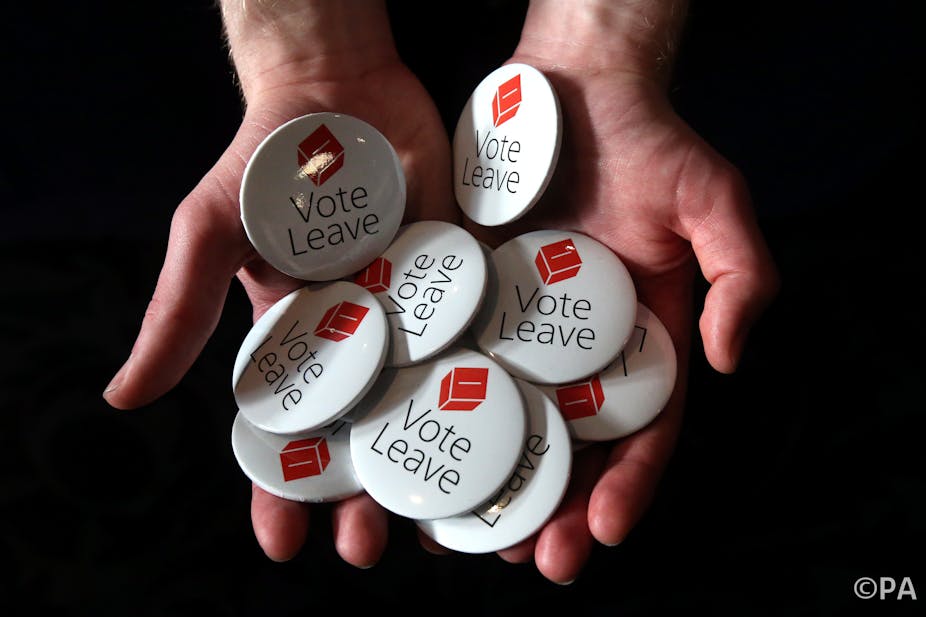The Electoral Commission has selected Vote Leave as one of the two lead campaigns in the European referendum. The nature and circumstance of this decision have highlighted the complexities associated with exercises in direct democracy.
Vote Leave was chosen ahead of two other bidders to be made the designated primary pro-Brexit group – Grassroots Out (the closest rival) and the Trade Union and Socialist Coalition. The position of the “remain” lead campaign, secured by Britain Stronger in Europe, was uncontested.
The benefits of being chosen as a lead campaign are a spending ceiling of £7m (compared to only £700,000 for non-lead campaigns), free publicity including mailouts and television broadcasts, and £600,000 in additional public funding.
Vote Leave was the more mainstream of the groups that sought to lead the “leave” campaign, with two prominent Conservative politicians – Michael Gove and Boris Johnson – in prominent positions. It is seen to be less focused on immigration as a core issue, in contrast to Grassroots Out, which is supported by UKIP leader, Nigel Farage.
In explaining its decision, the Electoral Commission said:
Where there are competing applicants for a particular outcome the law is clear, we must designate the applicant which appears to us to represent those campaigning for that outcome to the greatest extent.
Important figures connected to Grassroots Out, including Farage, are making conciliatory noises and suggesting an intention to cooperate with the lead campaign.
Aaron Banks of Leave.EU, one group that initially backed Grassroots Out, threatened to bring judicial review proceedings against the Electoral Commission. He subsequently withdrew his threat, but complaints like this are redolent of a long-established narrative surrounding opposition to EU membership in the UK. Those who dislike European integration may choose to see the Electoral Commission’s choice of Vote Leave as going with the “establishment”.
Over the decades, a key part of the Eurosceptic platform has been to protest against the idea of a cosy elite group that has set the UK on a path of integration, working in conjunction with its counterparts elsewhere in the continent and without the proper consent of the bulk of the population.
Regardless of its veracity, it is this account of UK participation in the EU that has helped prompt and justify demands for a referendum on continued membership. A plebiscite could be seen as a chance to remove the decision from the professional politicians in Westminster, and place in the hands of the people a power they have supposedly lacked: to decide their own future, inside or outside the EU.
But the practice of referendums is more complicated than this idealistic rationale suggests.
A political hand
The UK remains primarily a representative democracy, and decisions about when and over what issues to hold referendums, and on what precise terms, are generally taken by the UK government. Party political considerations are therefore likely to take precedence over any desire purely to discern and act upon the will of the people.
In 1975, the first UK-wide referendum occurred on continued membership of what was then the European Economic Community (EEC). The Labour prime minister, Harold Wilson, is thought to have initiated this vote mainly as a means of holding together his party and government – which was then seriously divided over the issue.
Wilson obtained the “yes” vote to continued participation in the EEC that he wanted. He benefited from the “no” camp – like the “leave” movement of today – being diffuse. It was drawn from the left and right wing margins of the political spectrum, while the “yes” grouping seemed by comparison a mainstream entity.
Wilson’s success in the referendum did not achieve a lasting settlement of the matter it addressed. Pronounced controversy over the EEC soon renewed itself within the Labour Party, which entered the 1983 general election pledging itself to EU withdrawal.
It became common to question the validity of the 1975 vote, on the grounds that the campaign had served to mislead the public about the decision, presenting it purely as one about remaining within or exiting a trade agreement rather than a more extensive, ever-expanding political and socio-economic project.
Challenges of legitimacy
To dispel concerns of a referendum being contaminated by outside forces – including the government and the media – legal instruments seek to ensure a more even competitive environment, including the rules relating to official campaign status. Yet these regulations can spark further challenges to the legitimacy of a referendum.
The lead-up to June 2016 has already seen dissent about the government’s pro-EU stance, and disagreement within the ranks of the leave groups themselves. So can we expect the 2016 referendum to produce a more effective resolution of the place of the UK within Europe than last time? It might – as was the case in 1975 – prove to be a prelude to further division and perhaps yet another vote at some point.
A verdict to remain in the EU could subsequently be depicted as the product of political manipulation, as in 1975. Equally, a leave verdict might be only the beginning of a prolonged episode of both legal and political controversy – the precise outcome of which is impossible to predict.

